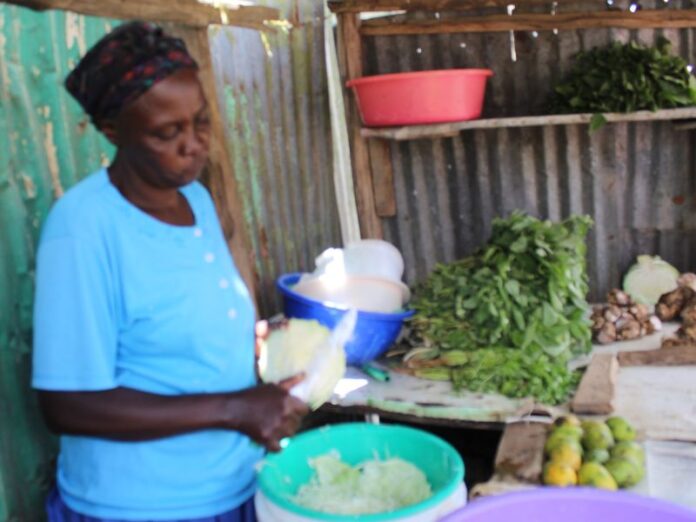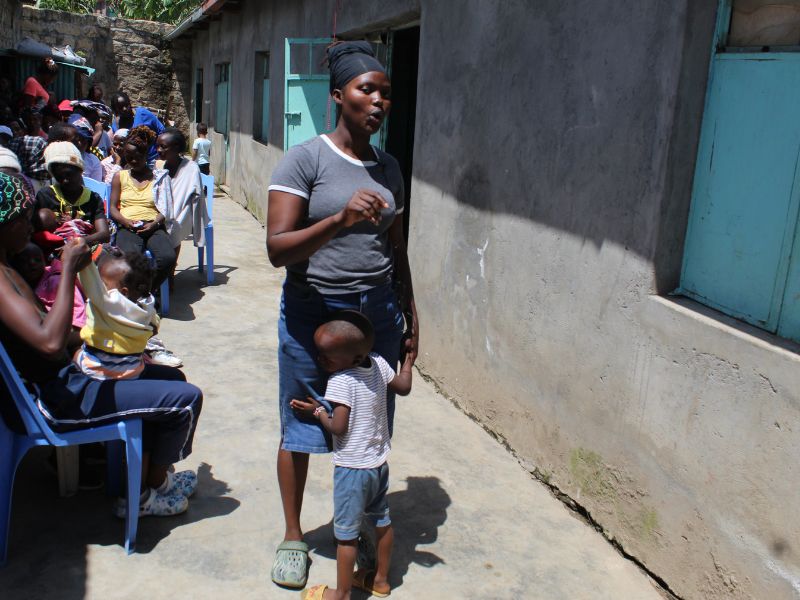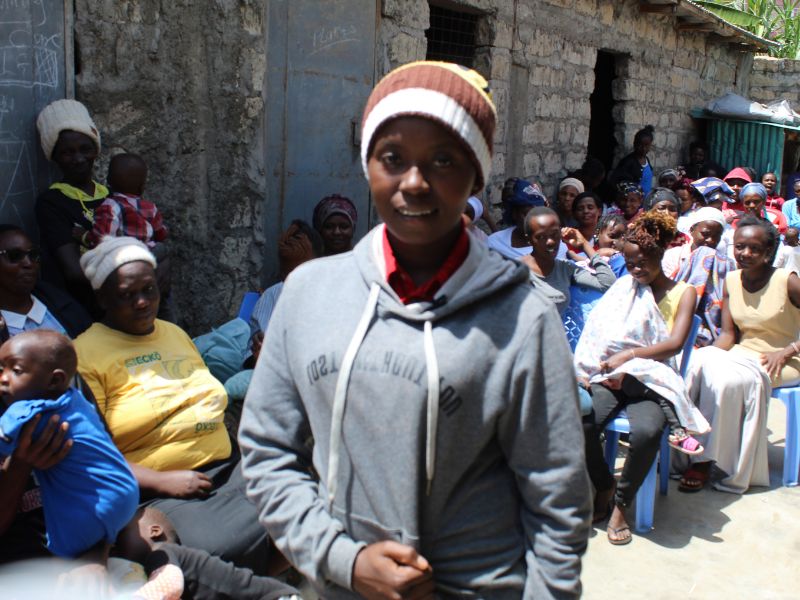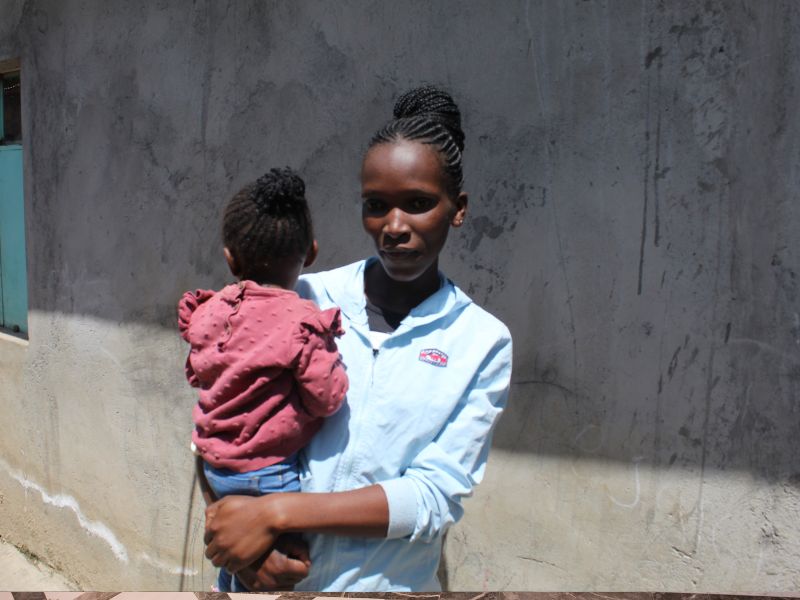
|
Getting your Trinity Audio player ready...
|
Mary Mwendwa
Nairobi, Kenya: It is mid-morning at Dandora estate, one of Kenya’s densely populated low income area located east of Nairobi. Here, high crime rate, gangs, unemployment, poverty, and early teenage pregnancies top among the challenges faced.
Low to high buildings, small grocery shops, and public vehicles popularly known as Matatus fitted with loud sound systems and colorful graffiti are a common scene on the busy narrow road from the city center to Dandora. Shouting from touts and other youths who get their daily wage from bringing commuters to the vehicles welcome any new person in this estate.
Security is usually one of the biggest concerns for journalists covering stories in Dandora. There have been cases where journalists have lost valuable equipment such as cameras and recorders to criminal gangs through mugging while on duty.
We were vigilant about this, we were picked by our host at a petrol station, who took us straight to the venue where women were gathered.
Here, a community-based organization known as Safisha Women Development Programme is helping women and young mothers to restore their life through savings that later fund their small businesses within the estate.
At the Molem area in Dandora, women gathered at a compound that used to be a school that closed due to Covid-19’s tough economic time. Young teenage mothers together with older women are gathered here. Some were seated on the floor while others were on the chairs. Small children aged four years and below are roaming and some are in this compound while the small ones and cuddled in their mother’s arms.
All are willing to share their stories of transformation.

The savings groups
Sarafina Wainaina, a mother of two, aged 22 beams with joy as she narrates her story of hope and resilience to Talk africa.
“I got pregnant with my first child at 16 while in form one. Life was very tough at home and a man from nearby enticed me with gifts and later I got into a relationship with him and got my first baby.”
Wainaina recalls how the man she thought loved her took off after he discovered she was expecting his child. “ He blocked me from his phone and even moved away from where we used to stay, I became so vulnerable and desperate as a teenage mother without any support.”
Wainaina was stigmatized by the community and family and yet she was young and had not attained the adult age of 18 as per Kenyan laws. This means that she was sexually violated by the man and nobody helped her to follow up on the case.
“I was struggling with life and again another man came into my life and made me pregnant. Now I had two babies to care for without any support.”
Last year, 2022 she was told about Safisha Group which empowers women through group savings to help them start small businesses. “I joined the women’s group and I was able to start saving and given a business boost as capital to start my coffee hawking business.”
“At first it was tough to convince people to buy my coffee, but with time customers embraced me and I am able to sell coffee worth KSH.500 (USD 5) per day and get a profit of KSH.500 . This helps me to cater to my needs and those of my children as the firstborn who is now 5 years are in school and the second born is two years old,” Wainana explains with joy.

Jessica Nyambura 19, is also a young mother who has benefited from Safisha group. She is a mother of one. Her story is not different from Wainaina’s. She also joined Safisha Group in 2022 and has no regrets. She also says, “ My life has transformed, I can now face tomorrow without more worries.”
“I hawk fruits like yellow passion, and watermelons among other fruits, this gives me some money for my daily upkeep, and I am able to contribute to my group KSH 20 (USD 20cents) every day. These contributions are pooled together and given to a member which later goes to boost their business. I get good profit that allows me to get enough for my upkeep and stock for the next day.”
Nyambura recalls how tough her life was before she joined the Safisha Group. “ I could not even afford food for my child and other basic needs. My parents were also strained because they have other children to take care of.”
“ Being a single young mother is tough, without support, it can get tougher,” she signs off.

Apart from young mothers, women of middle age are also beneficiaries of the economic empowerment project of Safisha. Margaret Nyambura who joined the group in 2016 has no regrets. Her brother died and left her with two children which formed part of her own for making her family expand. With no source of income, life became tough and at some point, she fell ill and was admitted to the hospital.
“Safisha group came in handy and took care of my children while I was at the hospital. When I recovered I came back and decided to start a second-hand clothes business. I have been selling clothes and I am able to even pay my rent. One time before I started business my house was locked due to rent arrears. That has never happened since I started the business because I save and I’m in a savings group that is available to offer help in times of need.”
Margret says that at times capital challenges her but through the group, she is able to get a boost.
Mary Wangare who owns a kiosk recalls how her four children could lack fees and even food before she started her kiosk business. “My life was hopeless, I could not even get casual work like washing clothes for people in the neighborhood. When I was told about a savings group I quickly gave it a try.”
Luckily, Wangare was given some money as capital and she was able to start her business. She earns between KSH 400- 500 (USD 4-5)profit per day and is able to contribute to her group 200 KSH (USD 2) per week.
Alice Muhonja the founder of the Safisha Foundation brings 400 women who are divided into 20 groups with each group having 20 women. Together they save and boost their small businesses.” Women in low-income areas need skills of survival more than handouts. Handouts are not sustainable and that’s why we encourage all members to have small businesses and can only get boosts when their capital base goes down.”
Muhonja further confirms that all the women in the group must have business ideas to belong to the group.
“The 20 groups contribute 20 (USD 2 cents)KSH every day from each member. They usually take a ballot every week where two members get 1000 KSH (USD 10) each to help them boost their businesses. So in every group, two members get the saved money every week .”
Muhonja recalls how during the covid-19 period many women became so vulnerable. “Teenage girls were getting pregnant and that put a heavy burden on the households. I quickly thought of bringing them on board to allow them to make a living through small businesses. This has been very successful despite some challenges here and there. At times some want to drop when they do not have enough capital, I chip in and give them some money to keep going.”

“One of the biggest challenges I have is when some of the women do not have enough capital to boost their businesses when the groups face challenges. I have to get my own money to give to the deserving cases who at times may want to quit the business. You know businesses are never smooth, some women run into debt and want to quit the groups and the businesses too. That’s where I come in and give some money to help them.”
Mohonja who also runs schools for the vulnerable in the community notes that she decided to start women’s groups to help women to ease their economic burden. “Some of the challenges these women faced just needed an intervention of helping them start small businesses.”
“I now have 30 young mothers in the groups I helped to start and we have seen a big change in their lives. They are all doing small business and life is manageable for them.”
Mohonja is also concerned about the teenage mothers who get pregnant as young s ten years and the perpetrators walk free. “ Any young girl below 18 who gets pregnant with an adult that is a sexual offense but you find the cases are not followed. At times I try to follow on my end and get lost along the way” she sighs.
A UN Women report revealed how covid-19 put an economic burden on women. It noted that the poor and marginalized were at a higher risk. The report from Insights to Action further revealed that the pandemic would push 96 million people into extreme poverty by 2021, 47 million of whom are women and girls.
Safisha Women Development Program is working towards reducing extreme poverty among women and young mothers in Dandora.













